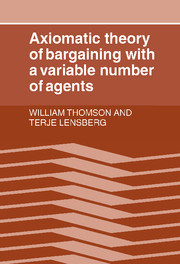
-
Select format
-
- Publisher:
- Cambridge University Press
- Publication date:
- March 2010
- February 1989
- ISBN:
- 9780511664489
- 9780521343831
- 9780521027038
- Dimensions:
- (228 x 152 mm)
- Weight & Pages:
- 0.5kg, 222 Pages
- Dimensions:
- (228 x 152 mm)
- Weight & Pages:
- 0.339kg, 224 Pages
- Subjects:
- Economics, Microeconomics
Book description
In this book, Professor Thomson and Professor Lensberg extrapolate upon the Nash (1950) treatment of the bargaining problem to consider the situation where the number of bargainers may vary. The authors formulate axioms to specify how solutions should respond to such changes, and provide new characterizations of all the major solutions as well as generalizations of these solutions. The book also contains several other comparative studies of solutions in the context of a variable number of agents. Much of the theory of bargaining can be rewritten within this context. The pre-eminence of the three solutions at the core of the classical theory is confirmed. These are the solutions introducted by Nash (1950) and two solutions axiomatized in the 1970s (Kalai-Smorodinsky and egalitarian solutions).
Reviews
’This is one of the best books ever written on normative collective choice.’
Ehud Kalai Source: Social Choice and Welfare
’For both the sympathetic and the critical reader, the well-written monograph is the reference book covering this strand of literature.’
Hans Haller Source: Mathematical Reviews
Contents
Metrics
Full text views
Full text views help Loading metrics...
Loading metrics...
* Views captured on Cambridge Core between #date#. This data will be updated every 24 hours.
Usage data cannot currently be displayed.
Accessibility standard: Unknown
Why this information is here
This section outlines the accessibility features of this content - including support for screen readers, full keyboard navigation and high-contrast display options. This may not be relevant for you.
Accessibility Information
Accessibility compliance for the PDF of this book is currently unknown and may be updated in the future.


